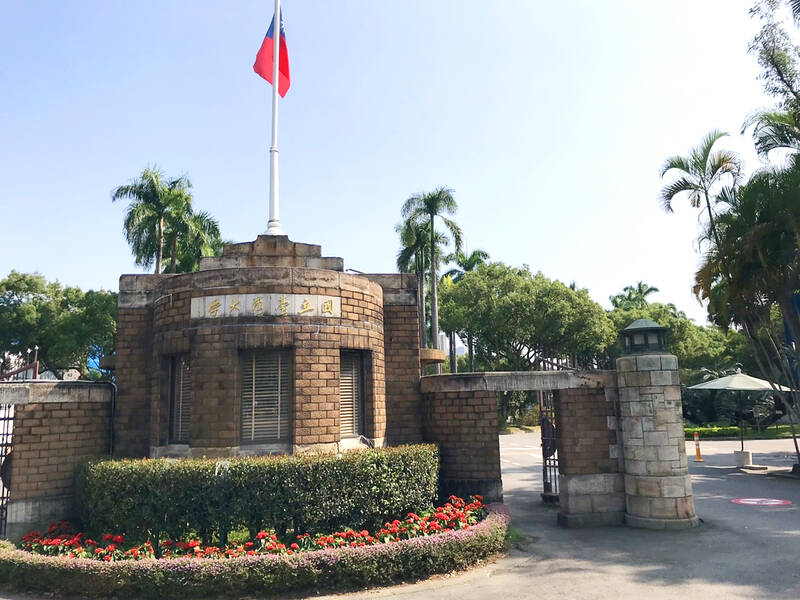Six Taiwanese universities that ranked among the 100 best universities in Asia last year made the cut again this year, with National Taiwan University (NTU) placing 29th, the UK-based Times Higher Education (THE) said on Thursday.
However, compared with last year’s rankings, NTU dropped eight spots.
Three other Taiwanese universities also saw their rankings fall, while two saw their rankings improve.

Photo: Yang Mien-chieh, Taipei Times
The five were China Medical University (33rd this year, up from 35th last year), Taipei Medical University (43rd, down from 29th), Asia University (49th, up from 78th), Yang Ming Chiao Tung University (85th, down from 44th) and Tsing Hua University (95th, down from 59th).
The top five universities in Asia in the report were China’s Tsinghua University and Peking University, the National University of Singapore, the University of Hong Kong and Nanyang Technological University in Singapore.
Rounding out the top 10 were Chinese University of Hong Kong, the Hong Kong University of Science and Technology, the University of Tokyo, and China’s Fudan University and Shanghai Jiao Tong University, which tied for ninth.
According to the report, the rankings covered 669 universities from 31 nations and territories in Asia, with Japan again leading the list with 117 institutions.
A total of 46 universities in Taiwan were reviewed in this year’s ranking, which used the same 13 performance indicators as the THE’s World University Rankings, though recalibrated to reflect the attributes of Asia’s institutions.
The performance indicators are grouped into five areas, reflecting teaching (the learning environment); research (volume, income and reputation); citations (research influence); international outlook (staff, students and research); and industry income (knowledge transfer).

‘DENIAL DEFENSE’: The US would increase its military presence with uncrewed ships, and submarines, while boosting defense in the Indo-Pacific, a Pete Hegseth memo said The US is reorienting its military strategy to focus primarily on deterring a potential Chinese invasion of Taiwan, a memo signed by US Secretary of Defense Pete Hegseth showed. The memo also called on Taiwan to increase its defense spending. The document, known as the “Interim National Defense Strategic Guidance,” was distributed this month and detailed the national defense plans of US President Donald Trump’s administration, an article in the Washington Post said on Saturday. It outlines how the US can prepare for a potential war with China and defend itself from threats in the “near abroad,” including Greenland and the Panama

A magnitude 4.9 earthquake struck off Tainan at 11:47am today, the Central Weather Administration (CWA) said. The hypocenter was 32.3km northeast of Tainan City Hall at a depth of 7.3km, CWA data showed. The intensity of the quake, which gauges the actual effect of a seismic event, measured 4 in Tainan and Chiayi County on Taiwan's seven-tier intensity scale, the data showed. The quake had an intensity of 3 in Chiayi City and County, and Yunlin County, while it was measured as 2 in Kaohsiung, Nantou County, Changhua County, Taitung County and offshore Penghu County, the data showed. There were no immediate reports of

The Chinese Nationalist Party (KMT) is maintaining close ties with Beijing, the Democratic Progressive Party (DPP) said yesterday, hours after a new round of Chinese military drills in the Taiwan Strait began. Political parties in a democracy have a responsibility to be loyal to the nation and defend its sovereignty, DPP spokesman Justin Wu (吳崢) told a news conference in Taipei. His comments came hours after Beijing announced via Chinese state media that the Chinese People’s Liberation Army’s Eastern Theater Command was holding large-scale drills simulating a multi-pronged attack on Taiwan. Contrary to the KMT’s claims that it is staunchly anti-communist, KMT Deputy

RESPONSE: The government would investigate incidents of Taiwanese entertainers in China promoting CCP propaganda online in contravention of the law, the source said Taiwanese entertainers living in China who are found to have contravened cross-strait regulations or collaborated with the Chinese Communist Party (CCP) could be subject to fines, a source said on Sunday. Several Taiwanese entertainers have posted on the social media platform Sina Weibo saying that Taiwan “must be returned” to China, and sharing news articles from Chinese state media. In response, the Mainland Affairs Council (MAC) has asked the Ministry of Culture to investigate whether the entertainers had contravened any laws, and asked for them to be questioned upon their return to Taiwan, an official familiar with the matter said. To curb repeated